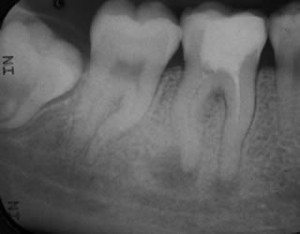Tooth Preservation – Root Canal Treatment
How we treat root canal infections and help to save the infected tooth
 If you were asked what is the worst pain that you could imagine, we are sure that some of you would say ‘root canal’. This is unfortunate and also untrue. It is likely that its reputation stems from a time when anaesthetics and x-rays were not so effective and where an abscess was present, it certainly could be quite painful.
If you were asked what is the worst pain that you could imagine, we are sure that some of you would say ‘root canal’. This is unfortunate and also untrue. It is likely that its reputation stems from a time when anaesthetics and x-rays were not so effective and where an abscess was present, it certainly could be quite painful.
Patients of the Foxhall Dental Practice need have no such worries. If you need to have root canal treatment, we will always take an x-ray prior to the treatment and if any abscesses are discovered, these will be treated first. Needless to say, modern local anaesthetics will numb the nerves of the tooth and, treated by our experienced dentists, you should feel no significant discomfort.
Having clarified that, let us take a look at why you might need this treatment and what it entails.
Why might you need root canal treatment?
This is a specific procedure which falls under the dental field of ‘endodontics’, literally meaning ‘inside the tooth’. It applies where the root canals have become infected. This is most likely due to the exterior enamel of the tooth having been compromised either through decay or perhap a crack or breakage. When this happens, bacteria can enter the root canals and cause infections to occur. Root canal infections can cause a significant amount of pain. This is because the nerves of the tooth are located there, along with other soft pulp materials. Whilst antibiotics can sometimes be used to address this, infections are likely to reoccur and a root canal treatment is the best, permanent solution to the problem.
The only other option to resolve this problem is to extract the affected tooth. This should only be done if there are other circumstances which dictate that this is the best choice. In most cases, our Ipswich dental team is likely to recommend root canal treatment.
What happens during the procedure?
As we have already mentioned, the tooth will first be checked for the presence of any abscesses. If any are found, they will be treated and the procedure postponed until the problem is resolved. A local anaesthetic will then be given which will numb the area and your treatment can then begin. Initially, the dentist will need to access the top section of the affected tooth and this is so that they can reach the root canals. This should not cause any significant discomfort although you are likely to experience vibrations etc from the drill used for this.
Once the top of the tooth has been removed, the infected material will be removed from the canals and the hollow canals then thoroughly cleaned to eliminate any remaining bacteria. Once the dentist is satisfied that the canals are bacteria free, they will be filled with a material called ‘gutta percha’. This is used for this treatment as it expands and is highly effective at sealing the canals, thereby helping to prevent the risk of any re-infection. In most cases, a crown will then be added to the top of the tooth, both to strengthen it and provide it with a natural appearance.
Your treated tooth
With most dental fillings, once the treated tooth has settled down, you will experience sensation as normal. This is not the case with a root canal treated tooth. This is because, along with the soft pulp, the nerves of the tooth will have been removed, leaving it without sensation. This can make it hard to judge how hard you are biting down on something and can cause the tooth to fracture in certain circumstances. It is important therefore that initially at least, you eat soft foods until you become accustomed to the way your treated tooth feels. When you do reintroduce harder foods, try to use other teeth to bite on them. Your treated tooth will be strong enough for everyday eating, but it pays to take a little extra care as this will help it to last longer.
With good care and cleaning, a tooth treated in this way can last for many years. This will vary from patient to patient but a little extra care when eating will help to extend this as far as possible.
Remember that, like many other dental problems, a root canal infection can often be prevented with early intervention. If a cracked or decaying tooth is filled before bacteria reaches the root canals, the procedure won’t be necessary. With this in mind, do make sure that you come to our Ipswich practice regularly for a check up. You can make an appointment by calling the Foxhall Dental Practice on 01473 258396.
